Los Angeles–The seizures of prohibited meat products from China continue at levels never seen before at the Los Angeles/Long Beach seaport. Just in the first quarter of fiscal year 2022, (October-December 2021) U.S. Customs and Border Protection (CBP) agriculture specialists intercepted 262,237 pounds (118,949 kilograms) of prohibited pork, chicken, beef and duck products, a 33 percent increase from same period the year before.

This concerning uptrend began intensifying in fiscal year 2021, when in the midst of the COVID-19 pandemic, the volume of prohibited animal products interdicted by CBP at the LA/LB Seaport reached an unprecedented 786,514 lbs. (356,757 kilograms) marking a staggering increase of 80 percent compared to the previous year.
From October 1, 2020, to September 30, 2021, LA/Long Beach CBP agriculture specialists issued 1,256 Emergency Action Notifications (EAN) for a 52 percent increase, and 166 Significant Incident Reports marking a 50 percent increment from the previous year. When unmanifiested/prohibited animal products are intercepted, CBP issues an EAN to initiate the destruction or re-exportation of the contraband.
According to USDA, China is a country affected by African Swine Fever (ASF), Classical Swine Fever (CSF), virulent Newcastle Disease (vND), Foot and Mouth Disease (FMD), Highly Pathogenic Avian Influenza (HPAI) and Swine Vesicular Disease (SVD).

CBP agriculture specialists found most of the unmanifiested animal products commingled in boxes of e-commerce shipments and household goods in a clear attempt to smuggle the prohibited meats.
Unregulated animal products from China are in high demand and smugglers attempt to smuggle those products into the United States for profit without regard to consumer safety or potential damage to the agriculture industry. Many consumers are not aware of the importation restrictions.
Pork products from ASF-affected countries may introduce the virus to the United States, crippling the domestic pork industry and U.S. pork exports valued at $6.5 billion annually. The ASF is spread by contact with an infected animals’ body fluids. It can be spread by ticks that feed on infected animals.



















